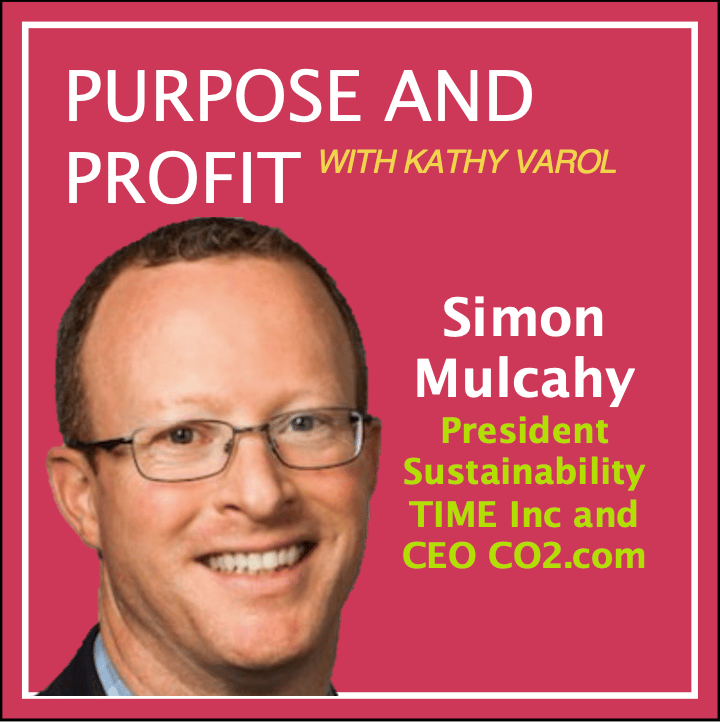Show Notes:
Simon Mulcahy is the founder and lead of C02, a company created to help businesses of all sizes become net-zero—the point at which the greenhouse gasses we put into the atmosphere are equal to the amount we remove from it—and nature-positive. CO2 offers climate-action portfolios that support high-quality carbon dioxide removal and reduction, as well as the protection of important carbon sinks, all while benefiting nature and communities. CO2 will also include a learning hub to provide guidance on pathways to becoming net zero and nature positive.
CO2 is a new division of TIME, Inc., where Simon is also President of Sustainability. TIME itself will be CO2’s first customer as the company works towards becoming net-zero by 2026 (or earlier). TIME will also continue to focus on climate leadership in its editorial coverage.
Simon and I met earlier this year at Dreamforce where I was on a panel called Sustainable To The Core that he moderated. I’m so excited to have him on the podcast and to share the work he’s doing.
In this episode we discuss:
✅ The difference between CO2 and a carbon offset marketplace
✅ Why it’s important to invest in a diverse set of climate solutions
✅ How CO2 is using a “shark tank” of climate scientists to select their portfolio
3 episode takeaways:
1️⃣ Analogies are a great way to give a frame of reference and put new ideas into context, but it is equally important to highlight where an analogy falls short. An analogy can shed light on where a familiar concept has been repurposed while leaving room to explain what aspects are entirely new. Using an investment portfolio as an analogy for CO2’s Planet Portfolio is a great example.
While the analogy captures the reasoning behind the portfolio approach CO2 is offering, the analogy falls short in other ways. For example, the Planet Portfolio’s “return” is a planetary return, not a financial return. Also, every carbon credit from the Planet Portfolio is retired the moment it is sold, so there’s no trading of the carbon credits the way there is trading of shares in an investment portfolio.
Simon does a great job of highlighting where the concepts are the same, and what the key differences are. An important takeaway about the Planet Portfolio is that it is a unique approach that any sized company can include in its sustainability strategy to complement its internal sustainability efforts.
***
2️⃣ When embarking on an unfamiliar journey, it’s important to have trusted experts and advisors who can support you along the way. Regulations on businesses are changing across the globe. As these changes accelerate, TIME Inc. identified a knowledge gap. This gap, if left unchecked, will limit the speed of adoption and will miss the opportunity to maximize the effectiveness of the sustainable business practices that are adopted. TIME created CO2 to fill that gap, and they are walking the walk. TIME is leading by example, becoming the first customer of CO2.
***
3️⃣ The pace of economic revolutions seems to be increasing. An economic revolution is defined as the rapid and thorough displacement of a regime or system by a new and very different regime or system.
The world’s first economic revolution was the Agricultural Revolution. This marked the switch from hunter-gatherers to farmers. The transition period took about 7500 years. The world stayed in the agricultural revolution for about 6500 years, until the Industrial Revolution kicked off in England in the mid-1700s. With the industrial revolution, industry began to forge ahead. The Industrial Revolution includes three chapters: the steam engine, the age of science and mass production, and the rise of digital technology.
The transition period from the agricultural age to the industrial age was significantly shorter than the previous transition. Both of these revolutions drastically changed the way societies functioned, and the laws that were needed to govern them.
It seems we’re on the edge of a new economic revolution. A displacement of systems we now know are degenerative is needed to protect the future of the planet and society. I hope this revolution centers on the values of humanity, equality, and conservation. I hope we are on the verge of a Regenerative Revolution.
References:
- The Edelman Trust Barometer
- Project Drawdown
- “The Oxford Principles for Net Zero Aligned Carbon Offsetting” (PDF)
- Conservation International

